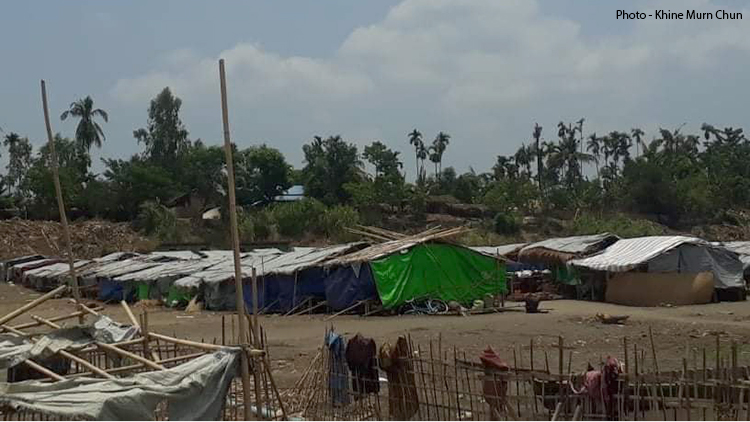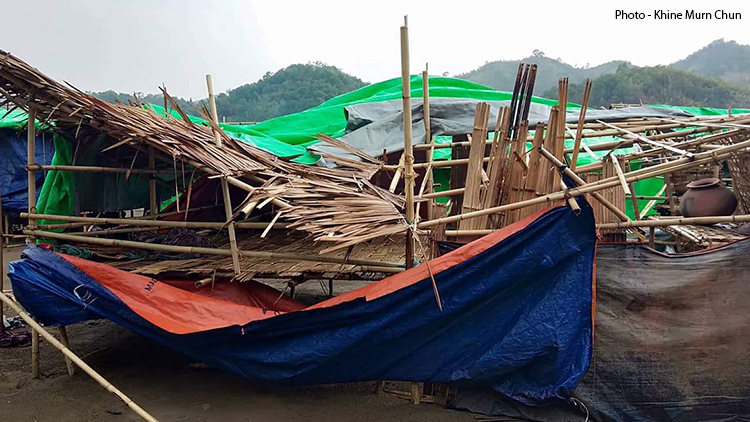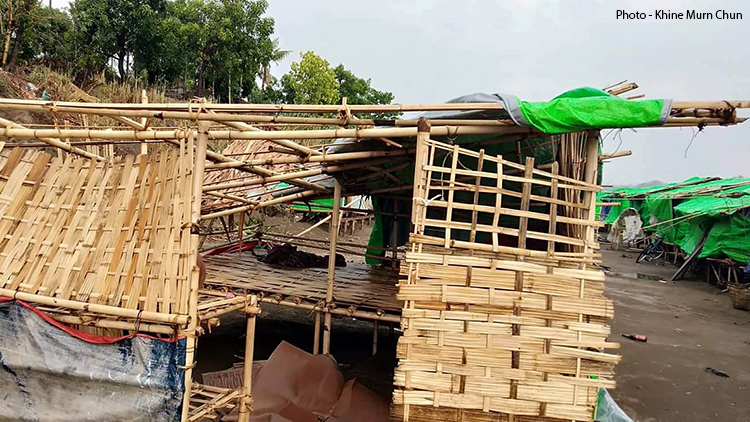- Hindus express hope for educational reform under AA administration
- Arakanese zat pwe performers struggle to survive as conflict halts traditional shows
- India-Arakan trade routes fully reopen after two-month closure
- When Prisoners Are Bombed, the War Has No Rules Left
- Two civilians killed, two injured in junta airstrike on Ramree village
Black sky at night, villagers feel fright
Some of them took refuge at IDP camps because they are afraid of going into the forest because of clashes near their villages while some of them took refuge because they could not continue their traditional farming practices because of dangers of landmines buried in the ground.
18 May 2019

Aung Kyi Moe (Thin Bone Dan) / DMG
As the Buddha’s saying goes, “Heytu Pyitsayaw” meaning results comes from reason, the battles in Arakan state broke out near residential areas instead of in the forests and jungles far from public areas. This resulted in many innocent people fleeing their homes to seek solace elsewhere, today the number of IDPs in Arakan State is increasing daily.
Some of them took refuge at IDP camps because they are afraid of going into the forest because of clashes near their villages while some of them took refuge because they could not continue their traditional farming practices because of dangers of landmines buried in the ground.
Some became refugees even though they didn’t hear the sound of gunfire but rumors about battles pushed them to IDP camps. There are also many anonymous IDPs who fled to their relatives’ residences as war waged on in Arakan State.
Although battles are the outcome of political problems and conflicts of interest that continue unabated, people become collateral damage from armed fighting and face various troubles as war refugees.
Currently, IDPs have faced many challenges as donors have to help new IDP camps rather than the old ones. Moreover, CSOs do not have unlimited access to areas in need because relevant authorities think it’s too dangerous for aid workers to travel to many camps where IDPs are. This puts a strain on IDPs who have food shortages.
That is why it is important to submit a comprehensive report to the Union and State governments to be able to recognize these people as IDPs so that they could live in comfort and safety for the short and long term.
The rainy season is coming soon unfortunately and there are not enough shelters and buildings for IDPs in the refugee camps. So, we need to consider how we can help them make their present living conditions more comfortable and safer for an indefinite period of time. Thus, aid programs of the government and international organizations such as NGOs/INGOs that are providing humanitarian aid are crucial at the present time so as to provide relief aid for them and resettle them.
Although activists in Arakan State who are working for war refugees in the state are trying to identify them as IDPS, it is not an easy task at the moment. Local people are designated as IDPs based on extenuating circumstances, but they weren’t actually considered as IDPS by the government. The government sees them as just people who are avoiding or hiding from their villages.

So, we need the help of media services in Arakan State and all news agencies to urge the Union government to officially designate them as IDPs. Furthermore, we need support from all CSOs such as the 88 Generation Peace and Open Society and other CSOs from all ethnic regions.
The number of IDPs can surge dramatically because of ongoing conflicts between the Tatmadaw and AA that keep occurring ad nauseam. First and foremost, IDPs need an adequate supply of food. Currently local CSOs in Arakan State are providing relief aid for them, but international organizations such as NGOs / INGOs that are working with the UN for providing humanitarian aid are being widely criticized for ineffective support. It is difficult for them to support Arakanese people under IDPs programs because the government didn’t apply the term “IDPs” to them.
So, we need at least one CSO to collect personal data, such as the number of IDPs that enter camps on a daily basis, pregnant women, children under 12 years and their health conditions in order to approach the Union government to properly designate them as IDPs.
In addition, we must create a website that local and foreign donors can visit to know which IDP camps currently need help. In addition, CSOs and Arakan State parliament need to draw up a plan of action for the long-term future for the IDPs. And we need a media network that’s willing to share all information.
Muslim refugees received international aid more than Arakanese during the 2012 riots because they could compile sufficient data on their refugees. So, we should have an organization that engages all social groups that could provide aid whenever it is necessary because the region often face natural disasters as well. It is not a good idea to establish impromptu organizations when emergencies and needs suddenly occur.
In addition, we should try to have specialized funds for IDPs for the short and long term rather than collecting donations and relief items.
It was raining unexpectedly for two consecutive days in some cities after the whole sky turned dark. I couldn’t sleep that rainy night. I was thinking of how IDPs could possibly sleep in a 10 square foot bamboo shelter during torrential rains because they have to sleep on the ground in a tiny shelter. I was thinking of the proverb “Misfortunes never come singly” which, unfortunately is a suitable thought for IDPs now.
The untimely rain on March 6 and 7, and May 15 destroyed the roofs of shelters in IDP camps. An image of IDPs out in the rain went viral on Facebook. They endure cold weather because all they had to sleep on were tarps that were strewn on the ground. The unexpected rain made all of them drenched to the bone and their firewood to cook food with was useless.
There are many refugee camps in Kyauktaw, Ponnagyun, Mrauk-U, Minbya, Rathedaung and Buthidaung Townships due to the civil war that’s been waged for many years. And the number of refugees in Arakan State has reached over 35,000 now according to volunteer groups. The number of refugees appears to drastically rise because villagers have to flee from their homes since ongoing battles occur almost on a daily basis. The 35,000 people that became IDPs within a half year is a new record for Myanmar.
Armed conflicts have broken out between the Tatmadaw and AA in the summertime since 2015 and hostility is escalating. Elderly people, pregnant women and children face both cold and hot weather conditions in temporary shelters in refugee camps. They are in need of emergency health care. One of the important needs in the camps is clean water. Since toilets in refugee camps were not built systematically, health and sanitation problems may likely occur.
The weather conditions in Arakan state are likely to be fierce in coming months. With not enough shelter, drinking water, health care and food, refugees have to fight for their lives. Since the number of refugees is increasing day by day, they might face more hardships. Since they cannot return back home and are vulnerable to nature’s elements, they may feel fear whenever they see clouds turn dark.

Most IDPs undertake agrarian practices in their region, but they could not check their farmland due to the ongoing hostilities in their region. Even though it is the harvest season, they are afraid of going home to harvest their crops because there are still smoke trails from gunfire. They could not reap the benefits of their farm. When will civil conflicts end once and for all in Myanmar? As long as ethnic groups feel that they don’t have equal rights, battles will go on and civilians’ dreams to return home to a better life will be out of reach.
If the battles in Arakan state keep on intensifying, children in refugee camps are going face educational challenges. Over 3,000 IDPs children will face difficulties with regard to their schooling in coming academic year in Arakan. There are no concrete plans on how the responsible authorities of State and Union governments will provide them education.
So, we’d like both sides to find a mutually agreeable solution as quickly as possible via roundtable dialogues that can result in peace and stability and improve development in the region so all sides can benefit from such productive and pragmatic actions. It is not enough to conduct prayer services to heal refugees’ physical and emotional pains. The government and armed ethnic groups must try to work together and find common ground to end all the conflicts before the ground is completely destroyed.







.jpg)












